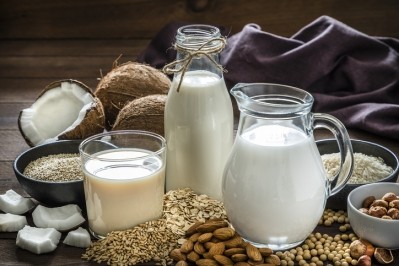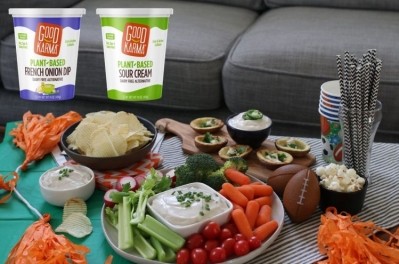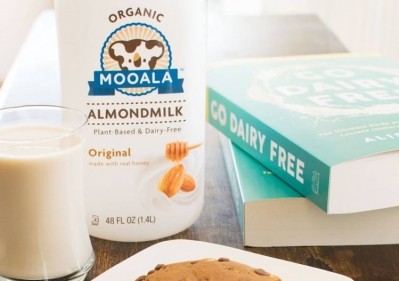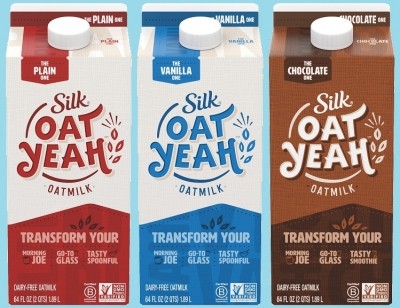If goatmilk gets a pass, so should almondmilk, says nonprofit; NMPF counters: 'A goat produces milk; a bean or seed does not'
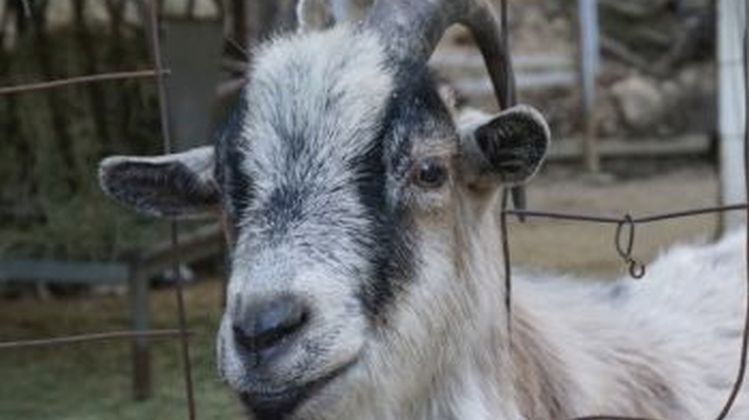
The Physicians Committee for Responsible Medicine, is one of the first wave of stakeholders to comment on FDA plans to look again at labeling conventions for plant-based dairy products as part of the agency's nutrition innovation strategy.
The nonprofit, which claims to represent 175,000+ “medical professionals, scientists, educators, and lay persons," argues that the FDA has no discretion to “selectively enforce its standard of identity against plant milks but not against [other] animal milks."
FDA standards of identity define the unqualified term ‘milk’ as the 'lacteal secretion, practically free from colostrum, obtained by the complete milking of one or more healthy cows, it adds.
“By focusing solely on cows, this standard excludes more than 13% of the animal milk such as that from goats, sheep, and buffalo sold worldwide for human consumption.
“Goat milk, lamb milk, sheep milk, and buffalo milk do not constitute the lacteal secretion of one or more healthy cows, and should equally be the source of the [FDA] Commissioner’s ire with respect to the standard of identity. Inconsistent enforcement of the FDCA would be arbitrary and capricious.”
NMPF: ‘A goat actually produces milk; a bean or seed doesn’t’
Asked by FoodNavigator-USA last year whether goat’s milk violated the federal standard of identity for 'milk,' Chris Galen at the National Milk Producers Federation (NMPF) said: “Regarding goat milk (or sheep), NMPF fully recognizes the suitability of a qualifier such as ‘goat’ or ‘sheep’ being used to distinguish among various types of mammalian lacteal secretions.
“However, it is disingenuous to link the name of an animal‐based standardized food with a plant‐based descriptor [eg. almondmilk]."
Dairy Pride Act would extend standard of identity to lacteal secretions of other hooved animals
The Dairy Pride Act which seeks to bar “non-dairy products from nuts, seeds, plants, and algae” from using dairy-derived terms, also includes wording that would permit products from the lacteal secretions of other hooved mammals such as goats to be described as 'milk,' 'cheese,' and 'yogurt,’ he noted, although this bill is not (yet) the law of the land.
The bill – which is currently sitting with the Senate Committee on Health, Education, Labor, and Pensions - states: “A food is a dairy product only if the food is, contains as a primary ingredient, or is derived from, the lacteal secretion, practically free from colostrum, obtained by the complete milking of one or more hooved mammals.”
While the FDA has ignored dairy producers’ calls for a crackdown on the use of dairy-derived terms such as milk and cheese on plant-based products in recent years, FDA commissioner Dr Scott Gottlieb indicated in July that a “a new compliance policy” may be on the cards.
The FDA is currently seeking comment from stakeholders and will post an additional request for information, likely in the late summer or early fall, “with a specific set of questions pertaining to consumer awareness and understanding of the use of milk and other dairy terms on plant-based alternatives, with a focus on nutritional impact.”
After that, it will consider “next steps, which will likely include issuing guidance for industry and a new compliance policy outlining our enforcement approach.”
But Dr Gottlieb cautioned: “We recognize that, as a regulatory agency, it’s not appropriate to unilaterally change our regulatory approach if we have a history of non-enforcement. We also need to closely consider the potential First Amendment issues related to the different uses of these terms.”
These products have a place in the market but should be properly labeled as ‘beverages or solutions’ and not as ‘milk’
The final deadline for commenting on the FDA’s nutrition innovation strategy – which includes proposals to modernize standards of identity and specifically to look again at the use of dairy-derived terms to describe plant-based products – is October 11.
To date, most of the comments have been from consumers and some dairy associations, with key industry stakeholders expected to comment closer to the deadline.
Consumers have expressed mixed opinions on the issue, according to comments currently sitting in the docket, with some observing that many other countries do not permit soy and other beverages to use the term ‘milk,’ but others pointing out that no one is confused about the origin or the nutrition of plant-based ‘milks.’
Read a selection of comments submitted thus far below:
Anonymous: Plant 'milk' is not milk. Period. It's crushed nuts and water, which is a nice snack, but completely different nutritionally than actual milk from cows, sheep, or goats. Stop letting them call that stuff milk.
Jackie McClaskey, Kansas secretary of agriculture: Enforcing standard of identity regulations is not an act of picking winners or losers, but rather being consistent and truthful to consumers. KDA strongly supports our soybean industry... we know that the market for plant-based beverages is growing, but we also support consistent and fair regulatory standards.
Anonymous: As a consumer that understands the importance of healthy, nutritious food, I wholeheartedly support clear, accurate, and truthful labeling. Plant juices are not milk and should not be labeled as such.
Sarah Cadwell: The American people are smart enough to understand that oat milk does not come from cow secretions. No one is trying to call it just ‘milk’ and pass it along as dairy milk.
Anne Mohel: It's a non-issue. Must we change ‘peanut butter’ to ‘crushed peanut spread?’ No one expects peanut butter to have the same nutritional profile as curdled and churned bovine mammary gland secretions. What about gluten free bread? Should it be labeled ‘bread’ if it's not made from wheat?
Kellysue Harook: If you start changing definitions to pacify lobbyists, then where will it stop, and who will it benefit? Not the average consumer.
Brent Buchanan: When plant-based ingredients are mechanically ground and mixed with water (typically at a five to 20% concentration), the term milk should not be permitted. The terms: juice, water, broth, drink, or beverage are far more descriptive and should be employed in labels for such products; and their appropriate use should be enforced by the FDA. The term milk should be reserved solely for that product which is synthesized by mammals.
It [also] makes sense that our products created and marketed in the US do not conflict with the labeling standards of our trade partners, such as Canada and the EU.
Francesca: The hard truth is dairy is expensive to make, has an intensely negative environmental impact, and is riddled with animal cruelty. I, for one, am happy that there are clearly labeled alternatives lining the shelves.
The Vermont Agency of Agriculture, Food and Markets: There are nutritional differences between plant and nut-based beverages and milk that may impact unsuspecting consumers. FDA should fully enforce the current law and standard of identity for labeling non-dairy beverages.
National Farmers Union: Extensive research has consistently demonstrated the benefit of milk. The nutrient rich profile is high in quality protein, vitamins, and minerals, and contains no added sugars. Should consumers wish to purchase alternative beverages, that is their choice, but there should be clarity that these imitation products are not a replacement for milk as labels might suggest.
Congressman John Faso (R-NY): Allowing plant-based products to be labeled as milk not only misleads consumers, but also negatively impacts our family farmers as demand for FDA defined milk has dropped due to consumers believing plant-based alternatives contain the same amounts of protein, vitamins, and minerals as the standardized dairy products.
American Dairy Products Institute: These products have a place in the market but should be properly labeled as ‘beverages or solutions’ and not as ‘milk.’ Some [consumers] actually are under the impression that because it says almondmilk on the label, that it is a one to one nutritional replacement for real bovine milk.
Kim Bremmer, American Dairy Coalition: Non-dairy plant alternatives vary between variety and brand, adding yet another layer of confusion to consumers when they are deceptively branded as milk.
David Bishop: Milk should be only on labels that come from lactating animals. Plant based products are just drinks with a lot of fillers and thickeners and contain no milk.
Michigan Milk Producers Association: Undoubtedly, some consumers do purchase plant-based products purposefully for several different reasons such as health concerns or personal preferences and beliefs, however, it is still incorrect for the manufacturers of plant-based products to misappropriate dairy’s healthy reputation for direct gain.
United Dairymen of Arizona: The trend in mislabeling is expanding each year, and needs to be corrected.

